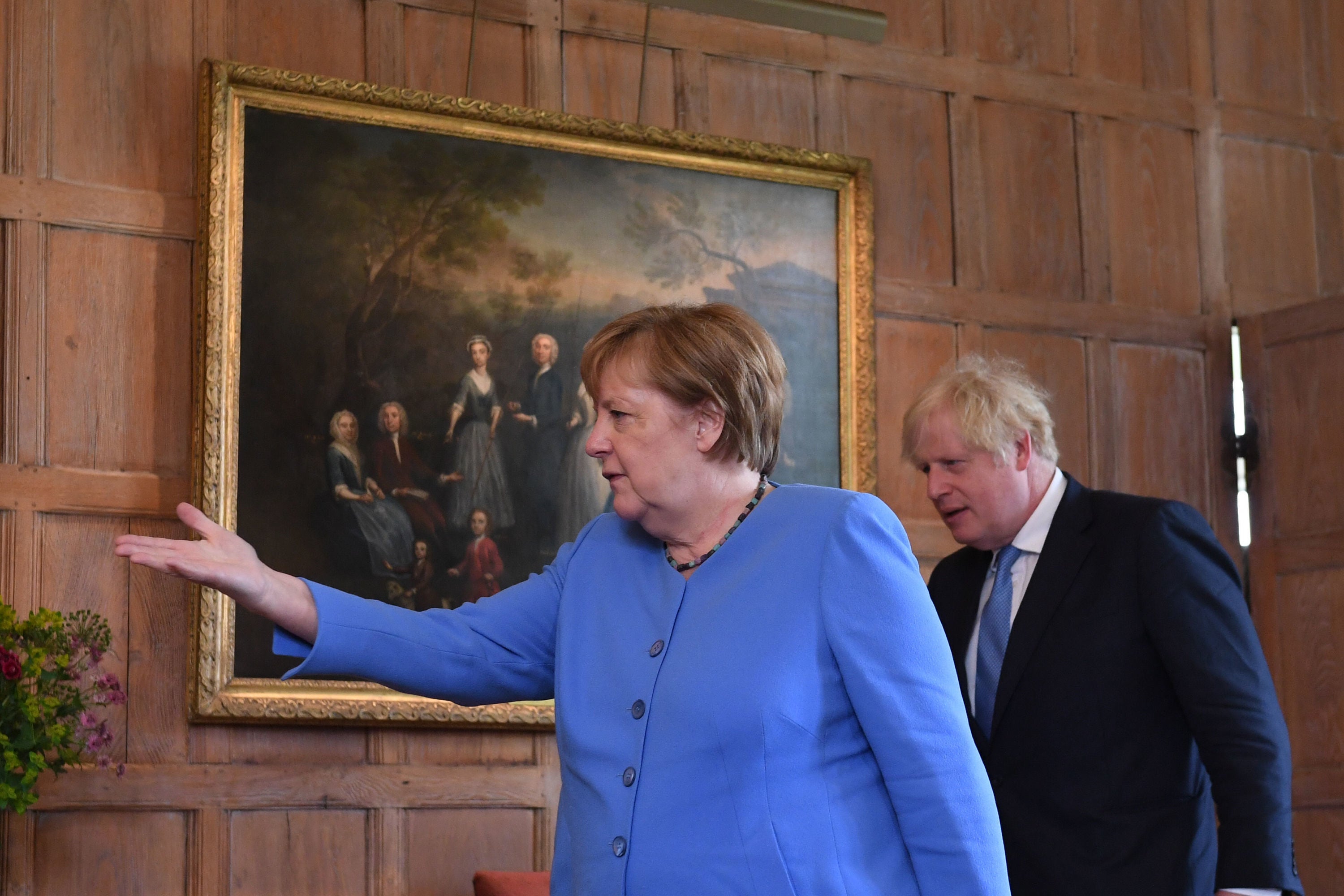Merkel says Germany could lift travel restrictions on double-jabbed Britons in ‘foreseeable future’
But Boris Johnson fails to extract immediate commitment from chancellor to lift controls

Your support helps us to tell the story
From reproductive rights to climate change to Big Tech, The Independent is on the ground when the story is developing. Whether it's investigating the financials of Elon Musk's pro-Trump PAC or producing our latest documentary, 'The A Word', which shines a light on the American women fighting for reproductive rights, we know how important it is to parse out the facts from the messaging.
At such a critical moment in US history, we need reporters on the ground. Your donation allows us to keep sending journalists to speak to both sides of the story.
The Independent is trusted by Americans across the entire political spectrum. And unlike many other quality news outlets, we choose not to lock Americans out of our reporting and analysis with paywalls. We believe quality journalism should be available to everyone, paid for by those who can afford it.
Your support makes all the difference.German chancellor Angela Merkel has paved the way for Britons to holiday in Europe quarantine-free, as long as they have had both doses of the Covid-19 vaccination.
Mrs Merkel suggested restrictions could be eased soon for “double-jabbed” Brits travelling to Germany, as the Delta variant continues to spread outside the UK. The German leader had been behind a push to coordinate other EU countries to clamp down on travel from the UK. But appearing beside Boris Johnson on a visit to the UK, she took a different tack and said her country could lift travel restrictions for those who have had two injections in the "foreseeable” future.
The prime minister has earlier met with Mrs Merkel to ask her to make it easier for Brits who wanted to to travel. But she declined to immediately lift controls and pointed out that the UK had also imposed rules of its own.
“We have adopted certain protective measures when we were not, as yet so familiar with a Delta variant,” the chancellor told reporters at a press conference.
“We now see that the share of those of the Delta variant in Germany is increasing very rapidly.
“As you know, we’re reviewing our travel restrictions continuously and we think that in a foreseeable future, those who have received double jabs will then, according to our classification – and now Britain obviously is a high incidence area – will be able to travel again without having to go into quarantine.”
She defended the restrictions saying: “Let me point it out again, it’s not only Germany that impose travel restrictions; the United Kingdom too has done quite a lot in order to protect its own citizens, and that is a continuous learning process that we undergo, is it not? We have to adjust the time and again to the most recent developments.”
Many countries, including those in Europe, have imposed extra restrictions on the UK because of its status as a hub for new variants of Covid-19.
Both the Kent variant and the Indian or Delta variant have become widespread in Britain well before many other countries who have imposed controls to try and stop the spread. Mr Johnson hailed what he suggested was “progress being made” on lifting restrictions.
The UK is also currently detecting comparatively large numbers of new Covid-19 cases, although deaths are much lower than previously due to the NHS’s advanced vaccination programme.
“You’ve heard what Chancellor Merkel just said about the German process and where they are on double jabs, and I think that’s great and that’s right: it sounds as though progress is is being made,” he said.
“I think that Angela is also right to point out that the UK, we also have very tough restrictions on people coming from Germany at the present time. That’s quite right, you’d expect us to have the toughest possible measures to stop the disease arriving in this country.”
Meanwhile, Mr Johnson played down concerns that up to five million Britons could be barred from taking European holidays because their vaccinations are unrecognised by the EU.
The prime minister said he was “very confident” the issue would be resolved.
The concern comes because Indian-manufactured doses of the AstraZeneca jab have a different name, which has not been authorised by Europe’s regulator and is not recognised by the EU.
Professor Adam Finn, who sits on the government’s Joint Committee on Vaccination and Immunisation (JCVI), said the jabs were “exactly the same stuff” as those not made in India.
Mr Johnson also announced that the UK and German cabinets would meet together annually, the first such arrangement between the UK and EU. Ms Merkel is stepping down as chancellor later this year, having held the role since 2005 when Tony Blair was the UK prime minister.
Join our commenting forum
Join thought-provoking conversations, follow other Independent readers and see their replies
Comments